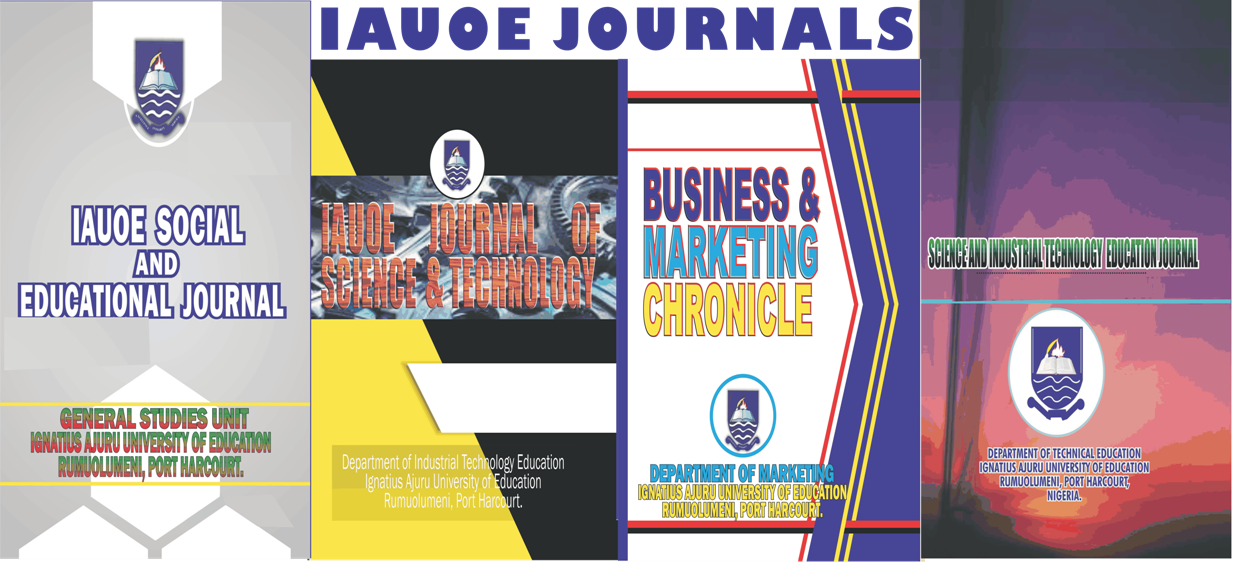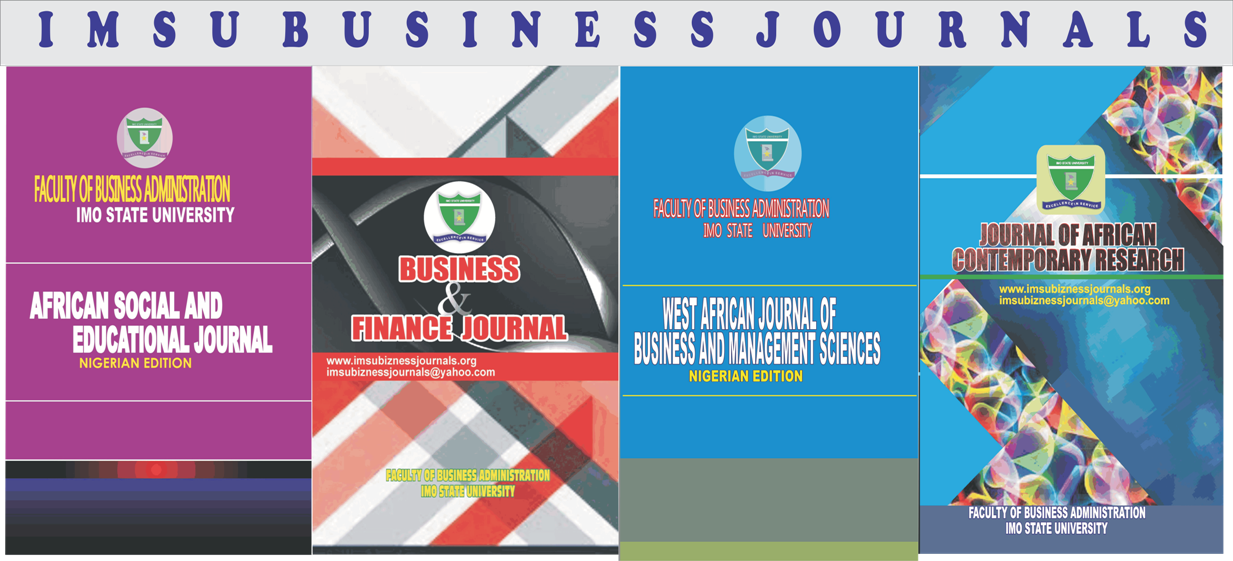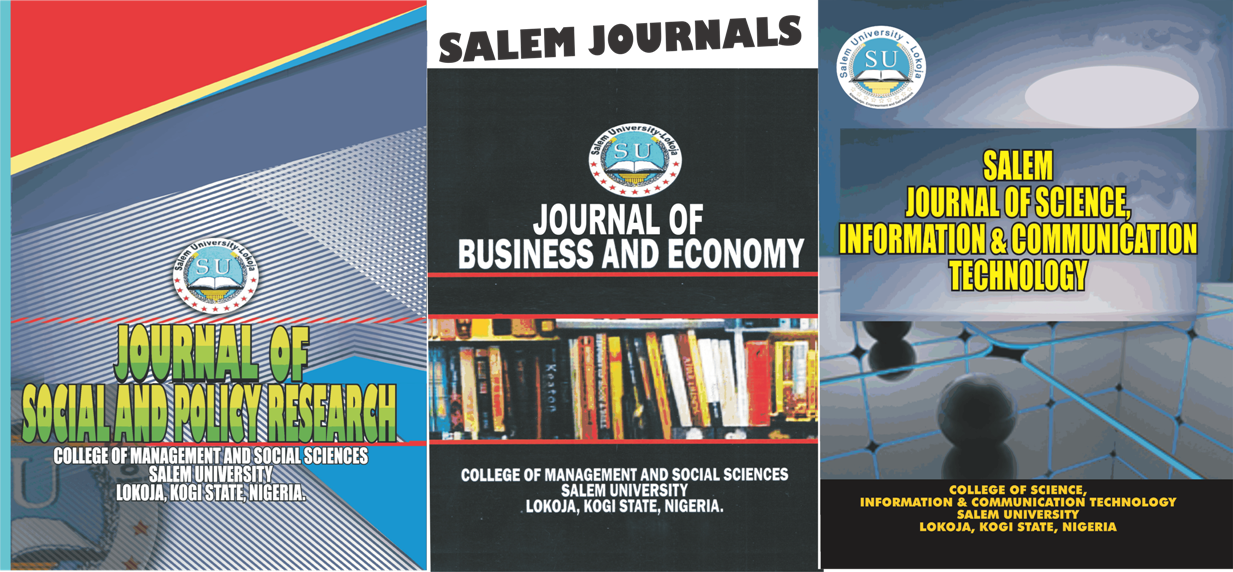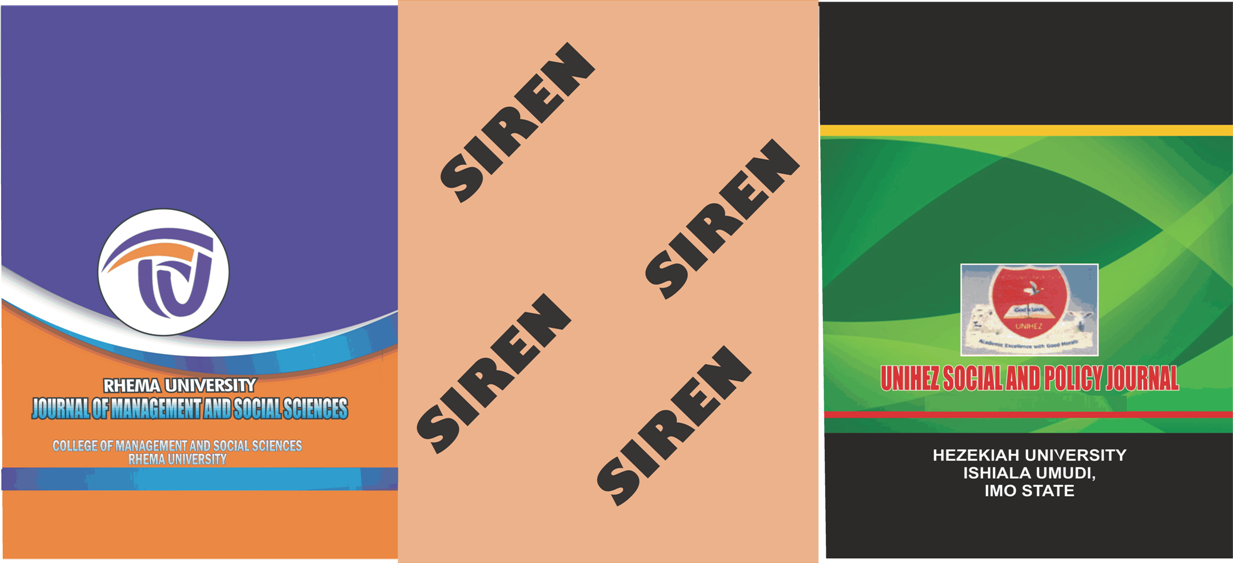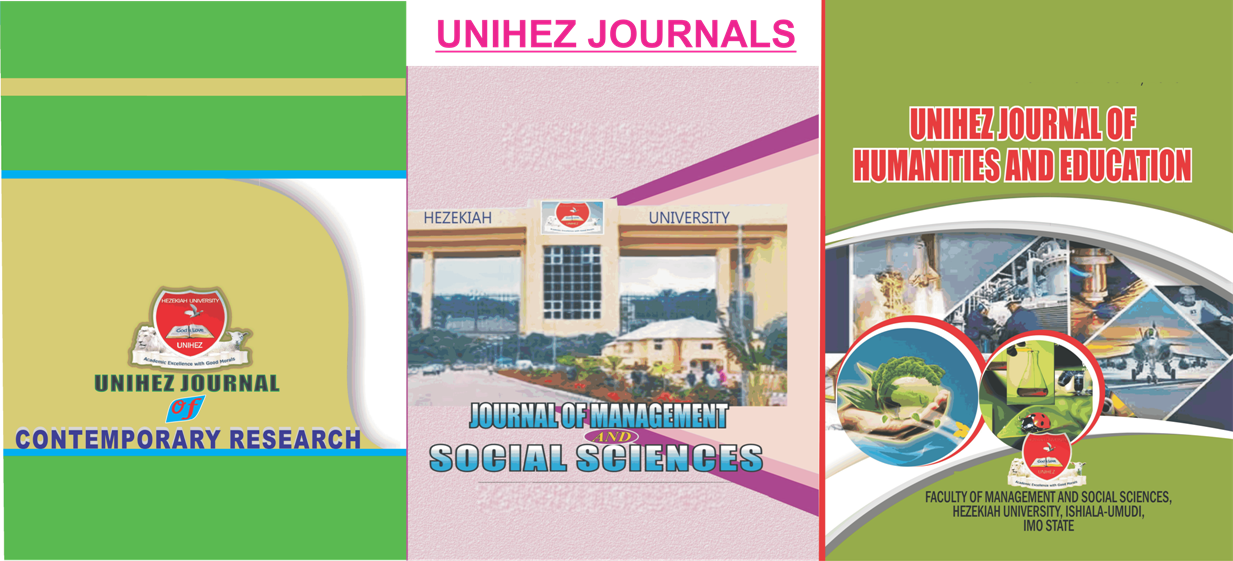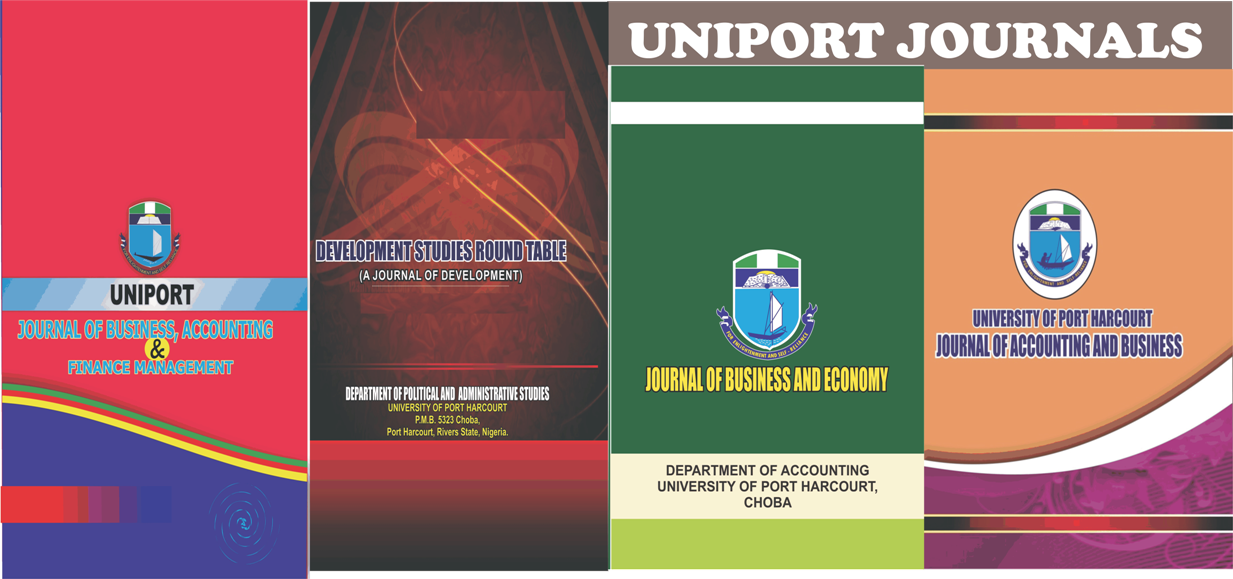2021 Archive
| 1 |
Title: NON-FINANCIAL INFORMATION DISCLOSURE AND FIRM PERFORMANCE.pdf Author: Egolum, Priscilla Uchenna., Ndum, Ngozi Blessing & Ezeh, Augustina Abstract: Abstract This study x-ray on the nexus between non-financial information disclosure and firm performance. Particularly, this study aims to explore the subject by employing a sample of forty (40) listed manufacturing firms in Nigeria for the period between 2010 and 2019. Non-financial information disclosure proxies which were considered in this study include; social media presence disclosure, risk management information disclosure and corporate social responsibility information disclosure which are also the independent variables. The dependent variable employed in this study is return on total asset while firm size and firm age are control variables. In this study, robust least square regression analyses technique is employed to evaluate the panel data set that were collated from annual financial reports of the sampled manufacturing firms. The finding indicates that corporate social responsibility and social medial presence information has no statistically significant relationship with firm performance in the context of return on total asset. However, risk management information has a significant negative relationship with firm performance of manufacturing companies during the period under review. Therefore, the researcher recommend that further studies should be conducted in the area of risk management information disclosure as it relates to firm performance in Nigeria. View |
| 2 |
Title: INNOVATIVE CORPORATE CULTURE AND WORKPLACE PRODUCTIVITY.pdf Author: Wosu, Emma O. PhD.,Nyone, Clifford B. PhD., Abbey-Kalio, B. PhD. & Akpasi, Stanley R. (ESQ) Abstract: Abstract The objective of the study was to critically examine the relationship between innovative culture and organizational productivity. Organizations are faced with the problem of low productivity. This could be caused by organizational cultures that are not creative, not competitive, strict adherence to power authorities, and lack of team spirit. The study concluded that adhocracy culture, market culture, hierarchy culture, clan culture have positive relationships with organizational productivity. The study recommended that organizations should be innovative, adaptable and dynamic in values, behaviour, and ways of doing things. Hence adhocracy culture, market culture, hierarchy culture, clan culture would enhance organizational effectiveness and sustainable competitive advantage. View |
| 3 |
Title: DOES THE LEVEL OF FINANCIAL DEEPENING AFFECT THE LEVEL OF HUMAN CAPITAL DEVELOPMENT IN NIGERIA.pdf Author: ANDREW E.O ERHIJAKPOR PhD. Abstract: Abstract The paper was undertaken to find out if the level of financial deepening affects the level of human capital development in Nigeria. To achieve the objectives, four research hypotheses were formulated and relevant data were sourced from the central bank of Nigeria (CBN) statistical bulletin (2019) and the united nation development programme (UNDP) database (2019), 1997 to 2019. The study used the human development index (HDI) as a proxy for human capital development (HCD) while the ratio of Broad Money Supply (M2) to Gross Domestic Product (GDP), the Credit to Private Sector (CPS) to GDP, the ratio of Commercial Banks Deposit (CBD) to GDP, and the ratio of Liquid Liabilities (LL) to GDP as independent variables. The ordinary least square (OLS) estimation results show that the independent variables M2/GDP, CDB/GDP, have a positively insignificant effect on HDI in Nigeria while CPS/GDP and LL/GDP have a negatively insignificant effect on HDI in Nigeria. The study, therefore, recommends amongst others that; the government should make the economy more liquid (i.e financial assets), the government should continuously reform the financial sector to meet with the best global practices, the government through the CBN should bring out policies that will encourage banking habits among the citizens (financial inclusion) and government should make the financial sector more responsive to investors and access to credits should be made easier for investment in order to improve human capital development vis-à-vis the economy. View |
| 4 |
Title: FINANCING STRATEGIES FOR THE SURVIVAL OF MICRO, SMALL AND MEDIUM ENTERPRISES (MSMEs) IN NIGERIA.pdf Author: IFEANYI S. MGBATAOGU PhD. Abstract: Abstract A key determinant factor in ensuring the realization and coming into fruition of perceived business ideas and innovation is good strategies and adequate funding. Without adequate funding the best dream will fiddle away and innovations will have still-birth. Thus, this study sets out to address challenges faced by Micro, Small and Medium Enterprises (MSMEs) as they relate smooth operations in general and funding in particular. The appropriate financing strategies for the long term survival and operation of these businesses are x-rayed. From the review of appropriate literature, it became obvious that Nigeria is not bereft of policies and programmes that tend to encourage entrepreneurial spirit and promote the operations of MSMEs including financing opportunities. The challenge therefore is what we can aptly summarize in two words – Efficiency Problem and “Information Blackout”. Thus, the study recommends among others that government and its agencies saddled with responsibility of promoting the operations of MSMEs should develop a holistic approach to policies initiated by them to ensure that target beneficiaries are reached. In this regard, they are urged to utilize the opportunity presented by ICT (Mobile Phone) to drive information dissemination. Also, promoters of MSMEs are encouraged to maintain proper accounting record and financial management as a good strategy to attracting funding from the appropriate sources including banks and other nonbank financial institutions. View |
| 5 |
Title: ENTREPRENEURIAL ORIENTATION ON PERFORMANCE OF SMALL AND MEDIUM SCALE ENTERPRISES IN EDO STATE.pdf Author: Kifordu A. A, PhD. & Ofili P. N, PhD. Abstract: Abstract The study evaluated the effects of entrepreneurial orientation on the performance of small and medium scale enterprises in Edo State. It specifically investigated the effects of innovativeness on performance; examined the effects of pro-activeness on performance and investigated the effects of risk-taking on performance. This research employed a descriptive survey design using a 5-point Likert scale questionnaire which was self-administered to respondents in Edo State. From the total population size of 898,084 small and medium scale enterprises in the observed States, a sample of 400 entrepreneurs was drawn with the aid Yamane (1967) formula. The hypotheses were tested using multiple regression while respondents demographic information was reported using descriptive statistics such as frequency tables. The findings of the study showed a positive relationship between all the three constructs of entrepreneurial orientation (innovativeness, risk-taking, and pro-activeness) and small and medium enterprises performance. The study concluded that all dimensions of entrepreneurial orientation had a direct impact on small and medium enterprises performance. View |
| 6 |
Title: MINDSET RE-ENGINEERING FOR NIGERIAN ENTREPRENEURS A FACTOR ANALYSIS.pdf Author: Onu, Abara Bodmas & Tounbra Felix Abstract: Abstract The research is centered on the mindset re-engineering for Nigerian entrepreneurs: a factor analysis. The approach adopted in this work was convenience random sampling method, and analysed using SPSS Version 27, using a probability value of 0.095 to give in-depth results and findings as well as review of literatures, which is also widely used in entrepreneurship research. The finding shows that entrepreneurship education successfully influences entrepreneurial self- efficacy, entrepreneurial attitude, and entrepreneurial mindset which create profitable business production. Students of Federal Polytechnic Ekowe, Bayelsa State were used as participants using structural equation model for questionnaires. The mindset of successful entrepreneurs is quite different from the mindset of traditional workers in many ways. Entrepreneurial self- efficacy encourages entrepreneurial attitude, and not entrepreneurial mindset. But, entrepreneurial attitude plays a role on both entrepreneurship education and self-efficacy toward students entrepreneurial mindset. Finally, there should be several capital support activities for Nigerian entrepreneurs to facilitate new products and businesses, and encourage diversification. View |
| 7 |
Title: ICT INVESTMENT AND BANKS’ FINANCIAL PERFORMANCE IN NIGERIA.pdf Author: Onuorah, A.C PhD. & Okoh, Ezekiel Oghenetega Abstract: Abstract Industrialization has brought about innovations for better efficiency in business. One of such innovations is Information and Communications Technology. The study sought to identify the effect of ICT investment on performance metrics of banks. Specific objectives of the study were ascertaining the effect of ICT investment on deposit base, net interest margin, total assets size as well as loan-deposit ratio. Data were sourced from CBN statistical bulletins in 2019. The data were analysed using measures of central tendencies as well as least squares statistics. Results of three of the objectives conformed to apriori expectations that ICT investment has positive and significant effect on deposit base, profitability and total assets size. Only loan-deposit ratio was not found to be affected by the independent variable of the study. It was recommended that management in the strategic cadre of commercial banks should take up more viable ICT investments for improved performance. View |
| 8 |
Title: NATIONAL SECURITY IMPERATIVES AND TOURISM DEVELOPMENT IN NIGERIA.pdf Author: John E. Chikwe, PhD. & Precious Onyinye Okey-Nwala, PhD. Abstract: Abstract The study fundamentally and empirically examined the impact of national security imperatives on tourism development in Nigeria since tourism industry is strategic to the socio-economic development and well-being of any economy. It adopted cross-sectional survey and structured questionnaire design. The sample size consists of 150 respondents drawn from private and public, including the Military, Police Force, Academia, Political Class and Transport Industry. After data cleaning, 134 copies of the questionnaire were used in the analysis. Data were analyzed using Pearson’s correlation technique at 0.05 level of significance, with the aid of Statistical Package for Social Science software. Leadership transparency and Accountability as components of national security imperatives had strong positive and significant relationship with infrastructural development and insecurity minimization, as the measures of tourism development in Nigeria. The implications of the findings and conclusions are that, lack of leadership transparency and accountability led to mass unemployment and high poverty rate, ethno-religious crises, low level of industrialization amongst others, and these resulted to high level of insecurity challenges bedeviling Nigeria today. The citizenry should adhere to the rule of law, minimize ethno-religious tendencies and crises, and maintenance of Federal character in public office placements, as to minimize insecurity and national security challenges for the enhancement of tourism development in Nigeria, as recommended. View |
| 9 |
Title: IMPERATIVE OF EMERGING DISEASES AND INVESTEMNT TRENDS IN THE NIGERIAN FINANCIAL SECTOR.pdf Author: Osuji, Casmir Chinemerem & Osakwe, Festus Chukwumah Abstract: Abstract This study empirically investigated the imperative of emerging diseases and investment trends in the Nigerian financial sector. The multiple regression analysis was used to test the research hypotheses. The regression result reported that Cholera has negative statistical insignificant influence on investment while HIV and Tuberculosis has no significant influence on investment. Meanwhile, Covid-19 Pandemic has negative statistical significant influence on investment. Hence, the study concluded that, among the emerging diseases, Covid-19 pandemic is a strong determinant of investment activities in the Nigerian financial sector. On this note, we recommend that there is need for policy makers to do a post-pandemic assessment all the sectors in Nigeria so as to build a disaster preparedness and management system which seems not to be in place at the moment. Again, the current social distancing, regular washing of hands, and the prohibition of large gatherings strategies of mitigating the spread of the virus should be sustained. Lastly, votes given to the health care sector should be increased as well to cover unforeseen outbreak that may ensue. View |
| 10 |
Title: CORPORATE SOCIAL RESPONSIBILITY (CSR) THE UNDERLYING PARADIGM SHIFTS MODELINGS’ THEMATIC REVIEW AND WAY FORWARD.pdf Author: John E. Chikwe, PhD. & Ibekwe Wechie, PhD. Abstract: Abstract The study carried out the thematic review and synthesis of literature concerning corporate social responsibility underlying paradigm shifts models and proffering of way forward. Areas covered include the Carroll’s Pyramid of Social Responsibility model involving, economic, legal, ethical and philanthropic goodwill (discretionary). The EFQM model shift involves social, economic and environment. This model emphasizes on respect for human right, proper handling of workers and customers alike, suppliers, exhibition of desirable corporate citizenship of the operating environment community and proper handling of natural environment. The sustainable development model emphasizes on the sustainability of environment. The CSR 2.0 model emphasizes on reversing poverty and enabling sustainability of our planet. The paradigm shift to the consumer-driven corporate responsibility model serves as a panacea to observed shortcomings of the previous models, and creation of a way forward. The adoption of this model makes the corporation to be profitable, sociable and exhibition of environmentally responsible behaviour, desirable reputation in the eyes of the public, customer-base scope expansion enhancement in relation to those who demand corporate social responsibility. In conclusion, the study arrives at the choice of the consumer-driven model of corporate responsibility, which in all ramifications enables the win-win situation, since the customers’ demands are met as a way forward, and recommends for the adoption. View |
| 11 |
Title: WORK LIFE BALANCE, COMPENSATION AND EMPLOYEE RETENTION AN EXPERIENTIAL STUDY OF PRIVATE UNIVERSITIES IN OGUN STATE, NIGERIA.pdf Author: Magaji Nanle PhD., Ogundiwin, Ijeoma Jacklin & Nnorom Goodluck Abstract: Abstract Globally, Employee retention for decades has become a subject of worry to organizations and their employees. Private universities in Ogun State, Nigeria and their employees are not exceptions, and this is as the result of lack of work life balance practices and effective compensation packages which have led to increased employees’ intention to leave and reduce employee retention. This study therefore, sought to examine the effect of compensation packages and work life balance on employee retention of selected private universities in Ogun State, Nigeria. Survey research design was adopted. The population of the study was 1540 academic staff of five selected private universities in Ogun State, Nigeria. The sample size was 637. Data were analysed using descriptive and inferential statistics. The findings revealed that there was a significant positive effect of compensation packages on employee retention (β = .954; R2 = 0.251, p View |
